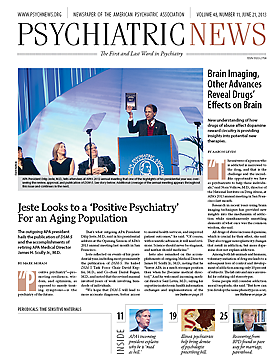“The brain undergoes a lot of wear and tear as it ages,” geriatric psychiatrist Gary Small, M.D., explained at APA’s 2013 annual meeting in May. Small has spent a career seeking ways to understand how that happens and how to mitigate or even prevent some of that decline.
“People equate brain health with memory, but it also involves thinking, reasoning, mood, relaxation, and physical activity,” said Small, a professor of psychiatry and biobehavioral sciences at the University of California, Los Angeles.
In the public mind at least, the neurodegenerative effects of aging are embodied in Alzheimer’s disease, he said. “The ‘A’ word terrifies everyone.”
Postmortem studies show that the brains of Alzheimer’s patients are marked by gross atrophy and are dotted with amyloid plaques and tau tangles. Since normal brains have small numbers of plaques and tangles, it is likely that Alzheimer’s develops slowly over the lifetime. Researchers are looking for imaging tests or biomarkers in blood or cerebrospinal fluid to identify and evaluate those precursor levels of the disease, Small noted.
So far, no medications have been found to stop the disease, although cholinesterase inhibitors can temporarily slow the decline of memory. Other drugs have been suggested but either are unproven for this use or have significant drawbacks. For instance, anti-inflammatory drugs do boost cognition and brain function, but Small does not recommend them because of their side effects.
If useful treatments await further development, enough is known to recommend preventive measures, Small pointed out. These include physical conditioning, mental stimulation, stress management, good sleep habits, and nutrition.
Physical activity in laboratory animals seems to result in larger brains and better memory, he noted. In human studies, cardiovascular conditioning is associated with larger parietal, temporal and frontal areas and with increased BDNF levels.
Education, even later in life, reduces Alzheimer’s risk, and training can improve cognitive skills, he said. A second language helps, too. Being bilingual reduces the risk of dementia.
“The Mediterranean diet—rich in antioxidants, fruits, vegetables, and protein—is good for the heart and the brain,” he said. Eating fish or other sources of omega-3 fatty acids appears to help, as does moderate intake of alcohol and caffeine.
“Memory training can improve memory ability quickly and can maintain higher performance for at least five years,” he said. He cited a Gallup survey indicating that at all ages, engaging in a greater number of healthy behaviors reduced the likelihood of reporting memory problems.
“Avoiding head trauma, stopping smoking, treating hypertension, and not being overweight are likely to help as well,” he said. Since genetic factors account for only one-third of the incidence of Alzheimer’s disease, such lifestyle interventions could help delay its onset in many people.
Genetic markers associated with Alzheimer’s confer risk but are not predictive, said Small. The ApoE4 variant appears in 20 percent of the population, but some carriers never develop Alzheimer’s, and again, physical activity can be preventive.
Psychiatrists are frequently confronted by elderly patients who have depression, and deciding on the optimal treatment when mood symptoms and cognitive symptoms overlap can often be a challenge. Small and colleagues have used PET scans to look at the effects of geriatric depression in Alzheimer’s cases. They saw evidence of plaques and tangles in the anterior and posterior cingulate and the frontal lobe.
“Perhaps some of the phenotype of geriatric depression is actually an expression of an underlying neurodegenerative process rather than a psychological reaction to something else,” he speculated.
For the moment, it is probably wrong to ask about preventing Alzheimer’s disease, he said. “The goal for the foreseeable future is not a cure but forestalling symptoms.”
Drug and biomarker development are keys to future effective interventions and prevention strategies, but current diagnostic and treatment strategies can improve function and quality of life. Concentrating on modifiable risk factors (like exercise and diet) can improve the quality of life today and stave off future Alzheimer’s symptoms, he concluded. ■

